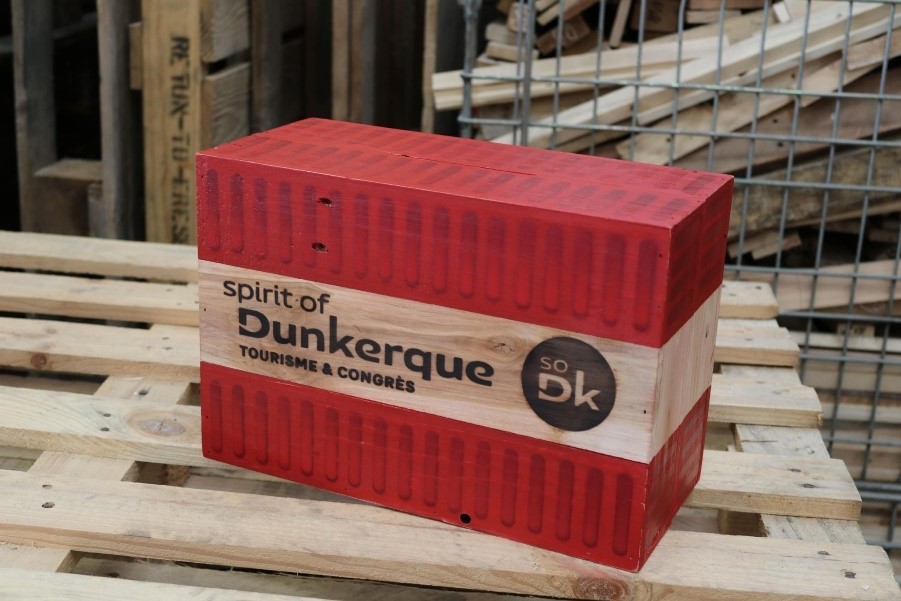Facts
- Country: France
- Type of provider: Tourist office
- Focus:
- The project to manufacture equipment, furniture and lunch boxes from recycled pallets concerns different stages of the life cycle: product design (R1), procurement and manufacturing (R2), product re-use (R3,R5) and end of life product recycling (R8).
Summary of the project
The tourist office regularly calls upon actors of the social economy to purchase objects or furniture manufactured according to the principles of circular economy.
Lunch boxes
In 2020, the tourist office wished to use an original communication tool to invite and encourage local professionals to participate in a remote breakfast during the lockdown, while at the same time promoting the assets and actors of the territory. To do so, the tourist office delivered a box containing local products (coffee, waffles, etc.) to the participants (companies and tourism professionals).
These boxes, called lunch boxes, were ordered from AFEJI and its collection and re-use centre Eco&Deko (also known in french as “ressourcerie du littoral”). They were made from pallets which were no longer included in the deposit-refund schemes which are usually applied to such products. The boards were cut, sanded and then went through several stages of assembly. The boxes were then hand-painted with images representing containers, a strong symbol of Dunkirk and its maritime activity.
Today, such "lunch boxes" are sold in tourist offices or offered to clients, particularly in the context of business tourism.
Furniture for tourist offices
The tourist office also worked with Eco&Deko to furnish its reception offices in Leffrinckoucke and Zuydcoote, two cities near Dunkirk, with furniture made from recycled materials. The recycled materials used are essentially wood, hardware and old furniture recovered from a Dunkirk landfill and local companies.
Urban furniture
The tourist office also asked the CETIDE association to make urban furniture with wood from old pallets. The association made a fence that is used to delimit a seasonal and secure bicycle parking area on the Malo-Les-Bains (Dunkirk) seawall.
Results
Overall, 500 lunch boxes were made and sold for 25 € per piece or offered to customers. This initiative was presented at the France Congrès fair, which brings together all French tourist offices. This activity has not yet been replicated in other territories.
In terms of synergies between actors, the project consists of a substitution synergy as recycled pallets are used to manufacture lunch boxes and equipment used by the tourism sector.
Partners
AFEJI
The AFEJI, the Flanders association for education, training and social and professional inclusion was created in 1962 to support vulnerable people, from infancy to old age: complex family environments, disability, loss of autonomy, support for family carers, social distress, access to employment, etc. The association now has 110 establishments and services throughout the Nord territory. In 2020, 3 000 AFEJI Hauts-de-France workers helped over 15 600 people. The AFEJI’s activities include integration workshops at the collection and re-use centre Eco&Deko.
Eco&Deko's activities consist in collecting furniture from the Rosendaël and Grand-Fort-Philippe landfills, cleaning, repairing, and redesigning them to then sell the furniture at low prices. Eco&Deko has 4 supervisors and employs 16 people in professional inclusion projects.
Dunkirk Dunes de Flandre tourist office and convention centre
The main activity of the tourist office is to welcome tourists, for instance by providing documentation on the town and the region in several languages and by helping tourists to reserve accommodation.
The tourist office also promotes Dunkirk's heritage and organises leisure and cultural activities, guided tours (of the belfry, a World Heritage site, the port by boat, the town, the seaside district), and different kinds of events.
In addition to welcoming and informing tourists, the Dunkirk tourist office informs the inhabitants year-round about touristic events, both inside and outside their city. Its objectives are to promote the city of Dunkirk, to operate the kiosks on the beach at Malo-les-Bains and to organise activities, particularly seaside activities.
CETIDE
The CETIDE, the technical centre for inclusion within the Dunkirk region and its surroundings, is an association for professional and social inclusion created in 1992. It offers social and professional support through subsidised employment contracts to people who have or are experiencing inclusion difficulties. The association welcomes approximately 100 people on assisted contracts per year. The inclusion programme at CETIDE combines a job, training and individual support to deal with social procedures.
The main integration contracts offered by the association are in the carpentry, finishing, building and handling equipment sectors.
More information
Do you want to know more about this organization? Please visit their website: https://www.dunkerque-tourisme.fr/
Facebook: https://www.facebook.com/Laressourceriedulittoral/videos/1019528065520928
Instagram: https://www.linkedin.com/in/eco-d%C3%A9ko-249870150/

